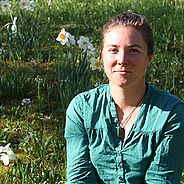Laure Gallien, ecologist at the Swiss Federal Research Institute WSL, has won a British Ecological Society Young Investigator prize. The prize – one of only five awarded each year – recognises the best research papers published in the Society’s journals by early career scientists.

Laure Gallien won the Robert May Prize for the best paper in the British Ecological Society journal Methods in Ecology & Evolution in 2014 for her paper “Identifying the signal of environmental filtering and competition in invasion patterns – a contest of approaches from community ecology”. The prize, which includes £250, a year's BES membership plus a year's subscription to the journal, will be presented at the British Ecological Society’s annual meeting in Edinburgh in December.
Although biological invasions are a major threat to biodiversity, understanding what drives the success of invasive species at the community scale remains a challenge. Two processes have been described as main drivers of the coexistence between invasive and native species: environmental filtering and competitive interactions. However, recent reviews have shown that competitive interactions are rarely detected, and thus their importance as drivers of invasion success placed under question. But can this be due to pure methodological issues? Using a simulation model of community assembly, Laure Gallien and her co-authors show that the infrequent detection of competition can arise from three important methodological shortcomings, and provide guidelines for future studies of invasion drivers at the scale of the community.
During her MSc in Biodiversity, Ecology and Evolution, Laure became passionate about the study of biological invasions, and decided to carry out a PhD on the ecological and evolutionary drivers of invasion with Wilfried Thuiller and Sébastien Lavergne at the Alpine Ecology Lab in Grenoble. She currently lives in Switzerland and works as a post-doc with Prof. Dr. Niklaus E. Zimmermann at the Swiss Federal Research Institute WSL, where she is working on the influence of evolutionary history on species invasiveness.
Further information
- Scientific article: 'Identifying the signal of environmental filtering and competition in invasion patterns – a contest of approaches from community ecology' by Laure Gallien, Marta Carboni and Tamara Münkemüller (Methods in Ecology and Evolution, 5: 1002–1011)